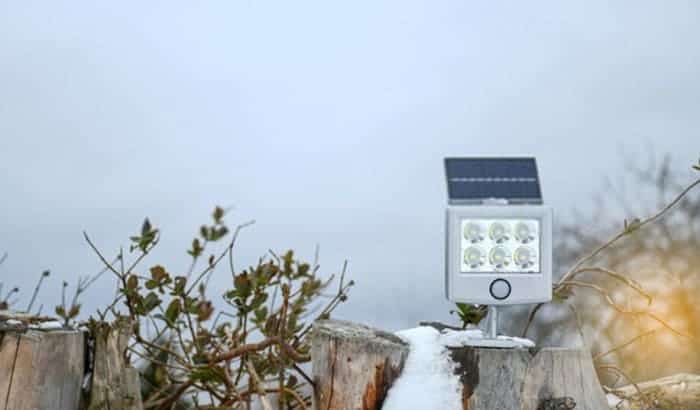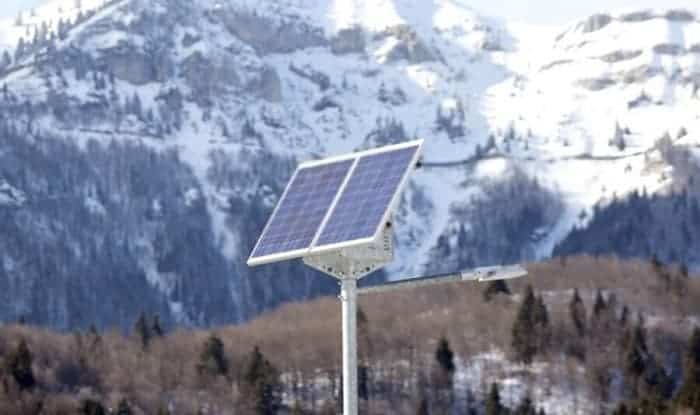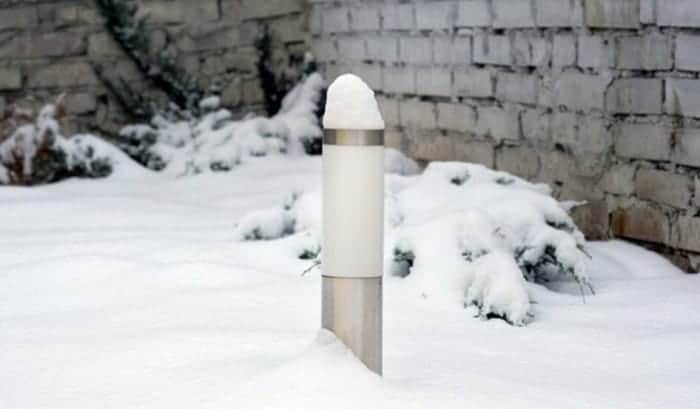While winter seasons are significant periods to enjoy long naps, hot beverages, and various winter sports, there are also some things we can’t do during these times. During winter, solar lights are a bit difficult to charge.
As you might already know, these solar lighting devices require sufficient sunlight to operate. Can solar lights stay out in winter? Will they operate well during the coldest season of the year?
If you’re planning to shift to using solar lighting systems but hesitating because you’re wondering if they’re ideal options for winter, this post intends to clarify those questions. Keep reading!
Table of Contents
Can Solar-Powered Lights Stay Out in Winter?
Are you having second thoughts about whether to buy solar lights or not? Do you hesitate because you’re wondering if they can serve their purpose during the coldest season of the year? These are just a few of the questions consumers ask before buying their preferred solar lighting systems.
Thanks to avant-garde technology and solutions, there are plenty of upgraded solar lights available today. Unlike in the past, solar lights nowadays are built with more enhanced features, making them ideal to use regardless of the season.
Winter solar lights work without any trouble regardless of harsh weather conditions. Whether it’s snowy or icy outside, they will work fine so long as they obtain adequate sunlight to charge each day fully. Luckily, the latest models are smooth sailing to maintain even in winter.
Will Solar Lights Work Perfectly in Winter?
Definitely, yes! Solar lights are specifically designed to work in different climate regions. Hence, they are durable enough to tolerate inclement weather conditions, such as severe snow and heavy downpours.
The newest versions are also quite a cinch to install, require little to no routine maintenance, regardless of the weather condition in your region. So, if you are currently residing in locations with heavy snowfall during the coldest season, rest assured that your solar-powered lights will continue to operate well.
Solar lights specifically designed to withstand winter seasons can build up a battery charge with light snow coverage on the solar panel. So, if debris, ice, and snow accumulate on the solar panel, all you need is to use a dry cloth and wipe them. Be sure to avoid using chemical-based cleaning agents on the solar panel.
Can solar-operated lights store solar energy on gloomy days? The good news is that solar cells can still absorb solar energy even on snowy, rainy, and cloudy days. They continue to convert solar power into electricity and keep this energy in the solar light’s battery.
You will see in this video how solar cells produce power using diffuse irradiation and direct sunlight.
The blue-colored diffuse sunlight is responsible for charging the solar cell during the daytime period even without direct sunlight.
Moreover, under gloomy or cloudy weather conditions, a solar cell can generate power coming from the few sun’s rays. Interestingly, it’s nice to know that diffuse sun’s rays can still produce a generous amount of power even without direct sunlight.
The same happens during winter, and cloudy days, solar power continuously powers the solar cell. Then again, it would be best if you were reminded that overcast days would reduce the duration of the solar-powered light. The solar-operated light must obtain 4 to 5 hours of direct sunlight to guarantee sunset to sunrise operation.
Will Solar Lights Light Up for an Extended Time During Winter?
The best solar lights are generally engineered to work all year round. For every hour of charging, this can provide one and ½ hours of lighting.
The Northern Hemisphere shifts away from the sun during winter; thus, there are only fewer hours in the daytime. So, this connotes that there are merely fewer hours for your solar-powered light to absorb sunlight to charge its battery.
The decline of sunlight absorption for most is approximately one to two hours; this largely depends on which part of the region you reside in. Although most solar light versions are equipped with premium quality lithium-ion batteries, the batteries don’t work more efficiently during winter.
Did you know that all batteries do not work exceptionally in cold temperatures? That said, expect a reduced duration than average, specifically if the temperature is below 32-degrees Fahrenheit.
What Can You Do to Ensure Excellent Performance from Your Solar-Powered Fixtures in Winter?
Purchase solar lights that are specifically built for winter conditions.
Many solar-powered lights are particularly crafted to work in locations that don’t obtain more sunlight during the coldest season. Such solar lighting units are designed with unique features such as a power-saving mode that minimize their brightness times automatically when the battery does not obtain sufficient charge. This feature enables the solar lighting system to last for an extended period.
You see, it is critical to search for the suitable model and trusted solar light brands that can cater to the requirements of your location and weather conditions.
Install the solar lighting system in the right spot.
When you set up your solar-powered fixtures, it is necessary to install them in areas that receive an ample amount of direct sunlight. It is strongly suggested to install them in areas where they can obtain an unobstructed view of sunlight as it infiltrates the sky from dawn to dusk.
Nonetheless, be reminded that the sun is in a distinct location at specific times of the year. So, it would help if you considered this when installing your solar-operated fixtures. The sun usually trails across the southern sky in the northern hemisphere, so it is vital to search for a placement that offers optimal sun exposure facing south.
It is also worth noting that the sun is lower in the sky and further to the south during winter. Hence, it requires traversing more atmospheres to reach the solar lights. Keep the solar lights away from anything that hinders sunlight exposure, such as tall trees, high buildings, etc.
More importantly, you should consider other solar lights in different seasons. For example in winter, a good choice is solar lights for shade.
Tilt the solar panels.
You may consider tilting the angle of the solar cell to obtain optimal power. This will, of course, depend on the type of solar-operated fixture you buy. If the type of solar light you purchase has this feature, it matters to tilt the solar panel towards the south.
In doing so, it will be at the right angles to the sun as possible. This technique is also beneficial as it can help prevent dirt, snow, and other stuff from building up and interrupting sunlight exposure.
Keep the solar-powered fixtures clean and clear all the time.
You need to pay attention to the transparent casing of the solar light. Where needed, thoroughly clean the surface using mild detergent and a soft sponge. Remember that your solar light and solar panel can work well if it is free of any dirt and debris that could impair its charging efficiency.
To improve your solar light’s performance, you may consider buying options that feature power-saving modes like motion-sensing spotlights.
Conclusion
Overall, while it’s true that solar-powered fixtures carry enough power to operate for several nights, it can be tricky to keep them operating throughout the dusky winter months, especially if you’re living in the northern states.
Solar cells don’t require direct sunlight to store power; however, some regions have superior average peak solar hours compared to other regions. The delightful news is that the straightforward techniques we shared above can help you enhance the performance of solar-powered fixtures during winter seasons.
By reading the information and tips shared in this article, hopefully, you can find the ideal solar lights that can satisfy your requirements.

I am Kathleen Miller, staff writer and reviewer of the Avasolar team. Working with the team has been a pleasure for me so far, I hope to bring readers useful information by creating detailed and easy-to-follow contents.



